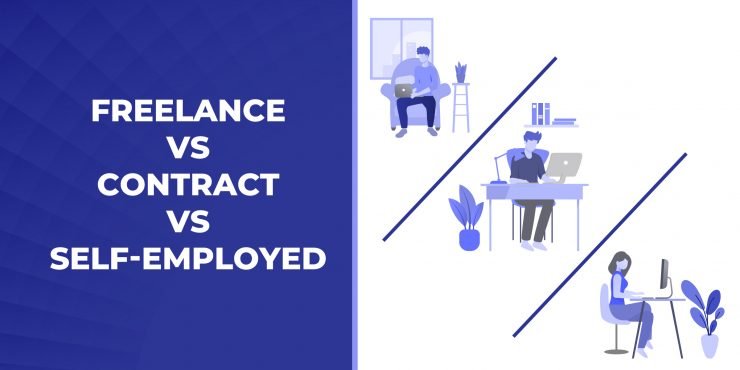Today's labor market is changing at a breakneck pace. Our work is changing, and the distinctions are becoming blurred or even overlapping. The number of jobs available has never been greater, but the risk of being exploited or getting into legal difficulty because of your work classification has also increased.
When you're looking for work, a lack of understanding of the distinction between a contractor, freelancer, and self-employed can significantly impact your hours, income, and schedule. To help avoid confusion, we've prepared this guide for you. Let's dive right in.
We offer this website completely free to our visitors. To help pay the bills, we’ll often (but not always) set up affiliate relationships with the top providers after selecting our favorites. However, we do our best not to let this impact our choices. There are plenty of high-paying companies we’ve turned down because we didn’t like their product.
An added benefit of our relationships is that we always try to negotiate exclusive discounts for our visitors.
What Is a Freelancer?


A freelancer is a non-permanent, self-employed professional who provides services and products to a variety of clients. Their involvement, scope of work, and contract length with a customer are not limited in any way. Nevertheless, freelancers are mindful of market volatility and will not focus on one client or a single firm as their source of revenue. With more long-term clients, they feel more secure in their jobs.
Many people work as freelancers in the media and creative industries nowadays. As such, you can expect to come across freelance designers, photographers, writers, and web developers. There are also freelance tutors, interpreters, and accountants out there.
Pros of Being a Freelancer
- Freedom in choosing clients: Freelancers can choose who they work with and how many clients they take on.
- Control over the amount of work: Work as many or as few hours as you like and pick projects that you find personally rewarding.
- Flexibility: Full- or part-time work schedules are up to you, and you can choose how much time you want to put in.
Cons of Being a Freelancer
- Irregular work: One of the most significant drawbacks of freelancing is securing consistent work. Projects can get started but then be put on the back burner. Contracts can be terminated early by clients. Finding new gigs can be challenging after finishing a job.
- Problems with cash flow: Although freelancers can fix their own rates to suit their needs, they must also collect payments. Problems can arise if a client refuses to pay.
What Is a Contractor?


A contractor is a non-permanent worker who provides services for multiple clients. Typically, these experts work with long-term clientele on large-scale projects. There are many ways to operate as a contractor, including working on-site at a client's place of business or from your own workspace.
Rather than working for an agency, contractors are highly qualified individuals that run their own businesses and provide specialized professional services. Independent contractors include lawyers, doctors, and dentists.
Pros of Being a Contractor
- You're the one in charge: When you work as a contractor, you are your own employer, which comes with its own set of challenges and advantages. You can work as much or as little as you want, whenever and wherever you choose.
- Networking opportunities: As a contractor, you'll meet a wide variety of people who can help you find new jobs or help you make the shift to full-time employment.
Cons of Being a Contractor
- Lack of benefits: Health insurance, vacation, sick leave, and retirement plans are generally unavailable to temporary workers employed by most companies. Contractors must pay for these benefits out of their own pockets, and they're expensive.
- Lack of organization: Most contractors are not bound to adhere to a set timetable. It can be difficult for some people to complete their tasks on time and consistently because of the absence of organization.
- No income stability: Regardless of how slow your employer's business is, you must be paid for the duration of your employment if you're employed. When you're a contractor, this isn't the case. Doing consistent business is essential to earning a living.
What Is Self-Employment?


Although freelancers and contractors are always considered self-employed, not all self-employed individuals are freelancers or contractors.
In the business world, the term “self-employed” is often used to refer to entrepreneurs. In fact, many business owners and startup founders see themselves in this category.
Self-employed people are the ones you think of when you hear the phrase “being your own boss.” Work schedules, projects, and methods are all up to them. Clients rarely have any influence on their behavior. Self-employed people are more inclined to employ or want workers, and they occasionally recruit freelancers to assist them.
Pros of Being Self Employed
- Opportunity to earn a living doing what you love: It is possible to turn your passion into a source of income by starting a business of your own.
- Flexibility and freedom: You are your own employer with no one instructing you what to do.
- There is no limit to how much money you can make: There is no upper limit to the amount of money you may make in your business because you get back what you put in. Your business's growth is totally in your hands.
Cons of Being Self Employed
- Self-employment taxes: Self-employed people pay additional taxes higher than those paid by employees.
- Lack of benefits: As a self-employed person, it can be difficult and expensive to secure health insurance. You don't have paid time off for holidays, vacations, or even paid sick leave. You won't get compensated if you can't or won't work. There is no 401(k) contribution, so you'll have to save for retirement on your own.
What Are the Tax Implications for Freelancers, Contractors, and the Self Employed?
For tax purposes, it makes no difference whether you identify as a freelancer, a contract worker, or as self-employed. It is your duty to pay your share of taxes. It's a good idea to start with the IRS checklist. This includes:
- Filing Schedule C: Schedule C is a special form that self-employed taxpayers must include with their personal tax return. Listed on Schedule C are your business profits and losses.
- Filing Schedule SE: These taxes are the same as the Social Security and Medicare taxes you would pay if you were an employee. As of 2021, the self-employment tax rate is 15.3%. Just like Schedule C, Schedule SE is filed alongside your personal tax return.
- Paying quarterly taxes: To figure out how much tax you'll owe each quarter, you can either forecast how much money you'll make this year or use the amount you paid last year. Calculating how much tax you'll owe is a good idea because underpaying your taxes could result in hefty fines.
- Receiving form 1099-MISC: This form indicates how much money you earned from a client during the year.
Nevertheless, don't forget to look into any local or state regulations that may apply. You will be subject to various tax obligations at local, state, and federal levels, depending on whether you've registered your company.
Are Freelancers Self-Employed?
Yes, freelancing is classed as self-employment. Freelancers are essentially their own business, responsible for finding their own clients, setting their own rates, managing their own taxes, and often providing their own equipment and resources to perform their work.
Freelance vs. Contract vs. Self Employed: How Are They Different?
Although these three job classifications are incredibly similar, they are still distinct. Here's a table to summarize their differences:
| Freelancer | Contractor | Self Employed | |
|---|---|---|---|
| Contract Periods | Short projects (by the day or hour) | Long projects (3 months to a year) | Flexible depending on preference (short or long) |
| Number of Clients | Juggles several clients at once | Can have several clients but not at the same time | Flexible depending on preference |
| Place of Work | Remote | Client’s office or remote | Remote, in an office, a physical building, etc. |
| Work Schedule | Flexible | Flexible or as set by the client | Flexible |
The Bottom Line
There is a constant flux in the labor market, and people need to keep up with it. Having the option to work as a freelancer, contract worker, or self-employed worker provides an extra level of flexibility and autonomy that some workers lack.
Which is the best option for you? It depends on your specific situation and goals. With this guide, we hope you have all the information you need to make an informed decision.



















